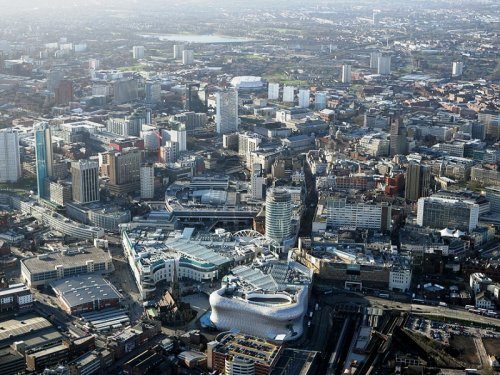West Midlands cities hardest hit by store closures

The difficulties facing retailers on West Midlands’ high streets are continuing, resulting in one in 50 shop units closing and not being replaced by another retailer in the first half of the year.
The region saw a net fall of 2.2% in the six-month period, with there only being 148 openings but 261 closures. The drop accelerates the long-term trend away from bricks-and-mortar shopping and also reflects fragile consumer confidence.
The net 113 closures followed 89 in the first half of 2018 and 33 in the same period in 2017.
Wolverhampton experienced the greatest impact across the region’s cities with a net loss of -13 stores with six opening and 19 closing. This was followed by Birmingham with a net loss of -10 stores with 38 openings and 48 closures. Coventry saw a net loss of -9 stores with 10 openings and 19 closures.
However, the high streets of some of the region’s towns are bucking the trend with Halesowen seeing a net growth of one store and Solihull and Stafford both maintaining their store numbers with no net loss.
The half year net decline in the West Midlands of -2.2% is greater than the average on Britain’s high streets of 1.83% – which is the highest since records began. The Midlands was one of the most impacted parts of the country by store closures, with the West Midlands (-2.2%) and East Midlands (-2.1%) placed second and third respectively for percentage of store closures after Wales.
The data has been compiled by the Local Data Company (LDC) for PwC and it found the number of shops in the region has fallen from 5,177 in January to 5,064 in July.
Sarah Phillips, retail and consumer specialist for PwC in the Midlands, said: “We are seeing retailers operating in an increasingly challenging environment and this is particularly exasperated in city centre locations where there is a high density of retailers. However, the rate of closures in the region’s cities is surprising at a time we are seeing significant investment and regeneration taking place across the region. For example Coventry’s Cathedral Lanes development attracting restaurants and bars is a magnet for eaters and drinkers on an evening. Birmingham is home to one of the largest young populations in the country and is seeing significant infrastructure investment. With Coventry City of Culture in 2021 and Commonwealth Games 2022 bringing an international audience to the region we can remain hopeful that this presents a huge opportunity for retailers to maximise.
“Town centre shopping centres, such as Halesowen, Solihull and Stafford, are bucking the trend with net growth or no closures. These are demonstrating how retailers can innovate and adapt nimbly to the environment. With the likes of Flannels opening in Solihull too, this will add to retail offering and put the town on the map as a shopping destination.”
The West Midlands saw some parts of the high street thriving with fast food takeaways (6), health clubs (3), restaurant bars (2), ice cream parlors (2) and toy shops (2) all opening new premises across the region. Whereas there was a fall in the number of game shops (-9) mens clothes shops (-9), take away food (-7) and charity shops (-7).
Continued Brexit uncertainty was a key factor in the downgrading of consumer spending projections in PwC’s latest Economic Outlook, despite strong wage growth.
Phillips added: “Among the sectors hardest hit are game shops and fashion – these are two key sectors we are seeing moving online to meet changing consumer behaviour. While retailers need to keep investing in their high street presence and propositions to meet consumer expectations, it’s also critical that we find ways to ease burdens on retailers, keep investing in the high street and encourage new and different types of operators to fill vacant space.
“We are seeing growth in the high street in areas where consumers still want to spend their money. In the West Midlands this is in the growth of gyms and restaurants and bars. Retailers are reimagining their retail space to incorporate experiential and leisure facilities to attract a new generation of consumer.”









